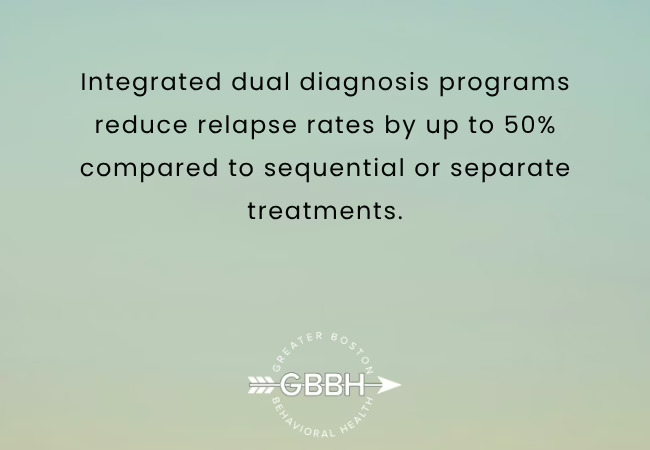What Are Co-Occurring Disorders?
Co-occurring disorders—also known as dual diagnosis—refer to the presence of both a mental health disorder and a substance use disorder in the same individual. These conditions are deeply intertwined and often fuel one another, making recovery more complex.
Common co-occurring combinations include:
- Depression and alcohol use disorder
- Anxiety and prescription drug misuse
- PTSD and opioid addiction
- Bipolar disorder and stimulant use
- Schizophrenia and cannabis use
Addressing both conditions at the same time is critical for effective treatment—and this is where comprehensive mental health programs in Massachusetts make all the difference.
Why Integrated Treatment Is Essential
Trying to treat mental illness and substance use separately often leads to relapse or incomplete recovery. Integrated treatment:
- Addresses underlying mental health issues that may drive substance use
- Reduces the risk of self-medicating behaviors
- Improves treatment engagement and retention
- Provides a more stable and supportive recovery environment
At Greater Boston Behavioral Health, we deliver evidence-based, integrated care that supports the whole person, not just isolated symptoms.
How Our Mental Health Programs in Massachusetts Help
1. Comprehensive Assessments and Diagnosis
Effective treatment for co-occurring disorders starts with a thorough intake assessment to identify both mental health and substance use conditions. Our licensed professionals:
- Screen for depression, anxiety, trauma, and psychosis
- Identify substance use patterns and triggers
- Evaluate medical history and risk factors
- Develop an individualized treatment plan with dual diagnosis care
2. Customized Levels of Care
At Greater Boston Behavioral Health, we offer a full continuum of care to match the severity of each client’s condition:
Partial Hospitalization Program Massachusetts (PHP)
For individuals who need structured, full-day support without hospitalization. PHP includes:
- Daily individual and group therapy
- Medication management
- Psychoeducation on both mental illness and addiction
- Crisis stabilization and emotional regulation work
Intensive Outpatient Program Massachusetts (IOP)
Ideal for clients ready to transition to part-time care. IOP includes:
- 9–15 hours per week of structured therapy
- Focused support for relapse prevention and coping
- Real-life application of treatment skills
Inpatient and Residential Treatment Programs in Massachusetts
For individuals needing 24/7 supervision, safety, and stabilization before stepping down to PHP or IOP.
Evidence-Based Therapies That Work for Dual Diagnosis
Treatment is never one-size-fits-all—especially when two conditions are present. We utilize evidence-based modalities proven effective for co-occurring disorders, including:
- Cognitive Behavioral Therapy (CBT): Reframes negative thought patterns and addresses core beliefs driving both disorders.
- Dialectical Behavior Therapy (DBT): Helps regulate emotions and improve impulse control—key for clients with substance use and personality disorders.
- Trauma-Informed Therapy: Recognizes that unresolved trauma is often at the heart of dual diagnosis cases.
- Motivational Interviewing (MI): Builds internal motivation for change, particularly in clients who struggle with denial or ambivalence.
- Group Therapy: Offers peer support, reduces isolation, and builds coping skills in a safe, structured environment.
Anger, Anxiety, and Depression: Common Dual Diagnosis Combinations
Anger Management Therapy Massachusetts
Anger issues are often connected to underlying trauma, anxiety, or substance misuse. Our therapy programs focus on:
- Identifying triggers
- Replacing reactive behaviors with healthy expression
- Reducing shame and guilt through emotional regulation
Anxiety and Substance Use
Clients may use drugs or alcohol to mask persistent anxiety. We offer anxiety treatment in Massachusetts that helps clients develop healthier coping strategies—without turning to substances.
Depression and Addiction
Depression often coexists with alcohol or opioid misuse. Our integrated approach to depression treatment in Massachusetts supports emotional healing while treating physical dependency.
Relapse Prevention and Long-Term Success
Recovery doesn’t end after a 30-day program. Long-term success requires:
- Ongoing mental health care
- Medication management (when appropriate)
- Sober support networks and 12-step integration
- Coping strategies for dual triggers
- Life skills development (employment, relationships, boundaries)
Our aftercare planning ensures that clients continue receiving mental therapy programs in Massachusetts even after completing PHP or IOP.
The Neurobiology of Co-Occurring Disorders: Why Dual Treatment Matters
Co-occurring disorders aren’t just behavioral—they’re neurological. Mental illnesses like depression and anxiety affect brain chemistry, as do addictive substances. When both conditions are present, they can disrupt:
-
Dopamine regulation (linked to pleasure, motivation, and reward)
-
Cortisol levels (impacted by chronic stress or trauma)
-
Executive function (decision-making, impulse control, focus)
This means that treating just one condition can leave the other unaddressed, leading to relapse or recurring symptoms. Our dual diagnosis care in Massachusetts targets both neurochemical imbalances and behavioral patterns for more complete healing.
Holistic Therapies That Support Whole-Person Healing
Innovative mental health programs in Massachusetts now include holistic treatment options to support emotional, physical, and spiritual health. At Greater Boston Behavioral Health, we integrate services such as:
-
Mindfulness and meditation to calm the nervous system
-
Yoga and movement therapy to release trauma stored in the body
-
Nutrition support to stabilize mood and energy
-
Art and music therapy to explore emotions in a safe, creative way
These non-traditional therapies often resonate deeply with dual diagnosis clients, especially when words alone fall short.
Continuity of Care: The Bridge from Crisis to Stability
One of the biggest challenges in treating co-occurring disorders is maintaining progress after the initial treatment phase. That’s why we provide a full continuum of care, including:
-
Step-down options (from inpatient to PHP, then IOP)
-
Ongoing telehealth check-ins
-
Support group referrals and alumni programs
-
Coordinated care with outside providers (primary care, psychiatry)
Our mission is to prevent clients from “falling through the cracks” after treatment—and instead guide them toward lasting independence and wellness.
Family Involvement in Dual Diagnosis Recovery
Families often carry stress, confusion, or enabling patterns that can worsen both disorders. We offer:
- Family education groups
- Multi-family therapy sessions
- Boundary-setting coaching
- Communication skills training
This empowers loved ones to support recovery without sacrificing their own wellbeing.
Why Choose Greater Boston Behavioral Health?
At our mental health treatment center in Massachusetts, we offer:
- Expert dual diagnosis treatment across all levels of care
- Trauma-informed, person-centered therapy
- Flexible scheduling with in-person and telehealth options
- A safe, nonjudgmental space to recover, rebuild, and thrive
Whether you or a loved one is facing anxiety, anger, addiction, or depression, our team is here to help—every step of the way.
Conclusion
When mental health challenges and substance use disorders intersect, healing requires more than just good intentions—it demands a coordinated, compassionate, and comprehensive approach. At Greater Boston Behavioral Health, we don’t just treat symptoms. We treat people.
Through our integrated Partial Hospitalization Programs, Intensive Outpatient Programs, and full-spectrum mental health programs in Massachusetts, we empower clients to address the root causes of their struggles while building the tools they need for lasting recovery.
Whether you’re managing depression, anxiety, trauma, or anger alongside substance use, you’re not alone—and you don’t have to choose between mental health and addiction care. You can have both. You deserve both. Call 888.278.0716 today to take the first step toward comprehensive, compassionate care that understands the full picture of your recovery. Because healing isn’t just possible—it’s possible for you.
FAQ on Co-Occurring Disorders
What are co-occurring disorders?
Co-occurring disorders, also known as dual diagnosis, refer to the simultaneous presence of a mental health disorder (like anxiety or depression) and a substance use disorder in the same individual.
Why is it important to treat both disorders together?
When treated separately, one disorder can worsen the other. Integrated treatment addresses both issues at once, improving long-term recovery, reducing relapse, and improving quality of life.
What therapies are used for co-occurring disorders?
Common therapies include Cognitive Behavioral Therapy (CBT), Dialectical Behavior Therapy (DBT), trauma-informed therapy, medication management, and holistic support like mindfulness and movement therapy.
What level of care is best for dual diagnosis treatment?
Depending on severity, treatment may begin with an inpatient or residential program, then step down to a Partial Hospitalization Program (PHP) or Intensive Outpatient Program (IOP). Each offers structured support while addressing both conditions.
Does Greater Boston Behavioral Health treat dual diagnosis?
Yes. Our team specializes in treating co-occurring mental health and substance use disorders through personalized, evidence-based care in a compassionate, trauma-informed setting.


